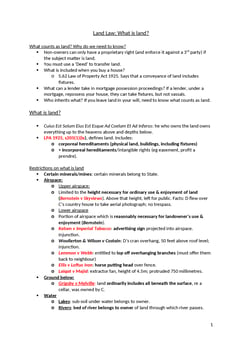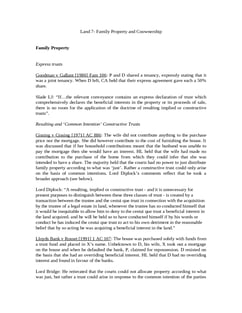Rhone v Stephens [1995] CLJ 60
Judgement for the case Rhone v Stephens
Table Of Contents
KEY POINTS
Equity does not cover the enforcement of positive covenants against successors in title of the land.
-
Lord Templeman:
Equity cannot compel an owner to comply with a positive covenant entered into by his predecessors in title without flatly contradicting the common law rule that a person cannot be made liable upon a contract unless he was a party to it.
Enforcement of a positive covenant lies in contract; a positive covenant compels an owner to exercise his rights. Enforcement of a negative covenant lies in property; a negative covenant deprives the owner of a right over property.
FACTS
-
This case involves two properties, Walford House and Walford Cottage, which had the same owner until Walford Cottage was sold in 1960. The 1960 conveyance contained two significant provisions:
Clause 2 maintained and granted rights between the properties.
Clause 3 imposed a covenant on Walford House's owner to keep the roof above Walford Cottage in good condition, allowing the owners of Walford Cottage to claim damages for any breaches.
After changing ownership, Walford Cottage's new owners sued Walford House's owner, alleging a breach of the covenant in Clause 3. The trial judge ruled in favor of Walford Cottage's owners, but the Court of Appeal reversed this decision and dismissed the claim.
Walford House's owner argued that the covenant was never violated because the deteriorated part of the roof belonged to Walford Cottage. Nevertheless, a review of the conveyance's plans revealed that the covenant to repair applied to the entire roof protecting both properties.
JUDGEMENT
Appeal dismissed.
COMMENTARY
Rhone v Stephens illustrated that positive covenants, which compel a landowner to take certain actions, cannot be enforced in equity against a successor in title who did not personally agree to the covenant.
This reaffirmed the fundamental principle that a person cannot be made liable upon a contract to which they were not a party of.
Positive covenants must be enforced as contractual obligations, and parties wishing to create obligations on successive landowners should do so explicitly through contractual means.
ORIGINAL ANALYSIS
A cottage attached to a large house was sold separately from the main house, and the seller covenanted in the conveyance to repair the shared roof. Before he could do so, both the main house and the cottage were sold. The new owner of the cottage sought to enforce the covenant against the owner of the main house.
HL held that the general rule is that covenants for positive duties are enforceable only as contracts and the burden does not run with the land in equity.
It rejected the doctrine of benefit and burden as a way of circumventing the non-enforceability of positive covenants rule.
Lord Templeman
Equity ought not contradict the common law and since positive obligations cannot be imposed under common law rules of privity, neither can they be allowed under equity.
For Further Study on Rhone v Stephens

A collection of the best GDL notes the director of Oxbridge Notes (an O...
Need instant answers? Our AI exam tutor is here to help.
Ask questions 🙋 Get answers 📔 It's simple 👁️👄👁️
Our AI is educated by the highest scoring students across all subjects and schools. Join hundreds of your peers today.
Get StartedSimilar Cases
Related Product Samples
These product samples contain the same concepts we cover in this case.
| GDL Land Law | Freehold Covenants 2 Notes (13 pages) |
| Land Law | Restrictive Covenants Notes (38 pages) |

 Since 2010, Oxbridge Notes has been a trusted education marketplace, supplying high-quality materials from top achievers at universities like Oxford, Cambridge, LSE, Harvard, and Yale.
Since 2010, Oxbridge Notes has been a trusted education marketplace, supplying high-quality materials from top achievers at universities like Oxford, Cambridge, LSE, Harvard, and Yale.